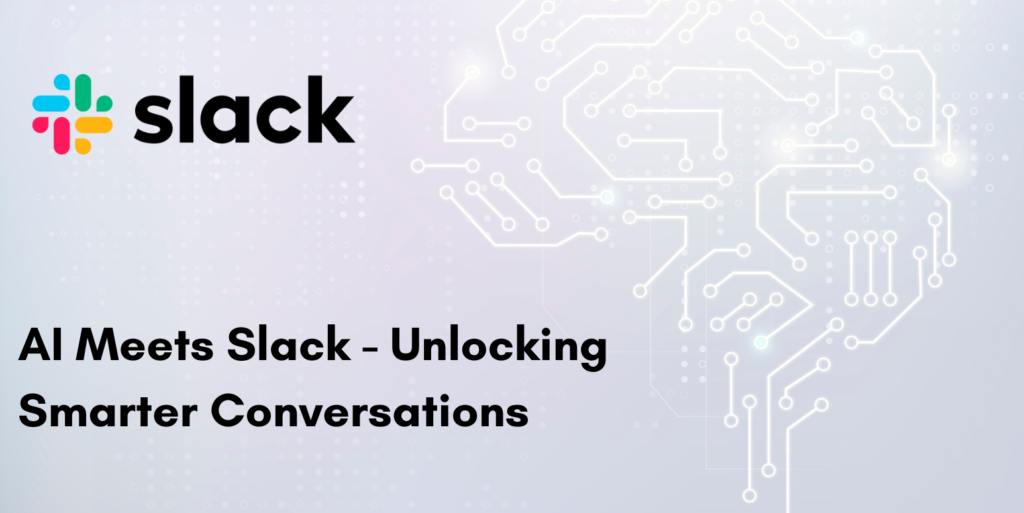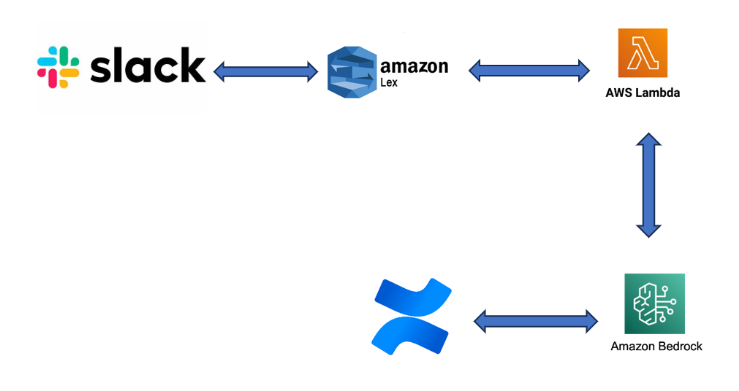
This case study examines the innovative integration of Slack with Amazon Lex, AWS Lambda, Amazon Bedrock, and Atlassian Confluence, showcasing how these technologies work together to create an AI-powered bot that transforms workplace productivity. By leveraging cutting-edge artificial intelligence and serverless computing, the system enables teams to access accurate, contextually relevant information seamlessly within their Slack workspace.
Modern workplaces often struggle with inefficiencies in accessing and managing information across diverse tools and platforms. Employees waste valuable time searching for data, navigating multiple systems, and performing repetitive tasks, which hampers productivity and collaboration. Existing solutions lack the seamless integration and intelligent capabilities required to address these challenges effectively.
The integration of Slack with Amazon Lex, AWS Lambda, Amazon Bedrock, and Atlassian Confluence offers a powerful solution to these challenges. This system introduces an AI-powered chatbot that understands natural language queries, automates backend processing, and retrieves real-time, contextually relevant information from Confluence. By combining advanced AI models and serverless computing, the solution provides precise, actionable insights directly within Slack, enabling teams to work smarter and faster.
The project introduces an intelligent chatbot embedded in Slack, a widely used team collaboration platform. The bot employs Amazon Lex to understand natural language queries and AWS Lambda to handle backend logic. Amazon Bedrock generates precise responses, drawing on real-time data from Atlassian Confluence using Retrieval-Augmented Generation (RAG).
This integrated system delivers actionable insights and streamlines workflows, making it a valuable asset for enhancing team communication and decision-making.
Serves as the user interface, allowing team members to interact with the AI-powered bot through channels and direct messages. This integration simplifies task automation and data retrieval within a familiar environment.
Facilitates natural language understanding (NLU) and intent recognition, enabling the bot to comprehend user queries and convert them into actionable tasks.
Acts as the backend processor, executing custom logic to retrieve and process data, integrate services, and deliver information to Amazon Bedrock for response generation.
Provides access to pre-trained language models for tasks like summarization, question answering, and text generation. It ensures responses are intelligent and tailored to user needs.
Serves as the knowledge repository, storing critical documents and data. The RAG model within Bedrock retrieves relevant information from Confluence, ensuring accuracy and contextual relevance.

The workflow involves the following steps:
This system has significantly improved the way teams collaborate and access information. By automating routine tasks and providing real-time insights, it empowers users to focus on strategic activities. The integration is particularly valuable for organizations with extensive documentation and complex workflows, as it enhances accessibility and usability.
The AI-powered Slack integration exemplifies the potential of combining natural language processing, serverless computing, and advanced AI models to revolutionize workplace communication. By addressing critical inefficiencies, this solution transforms the way teams work, paving the way for smarter conversations and greater efficiency in professional settings.